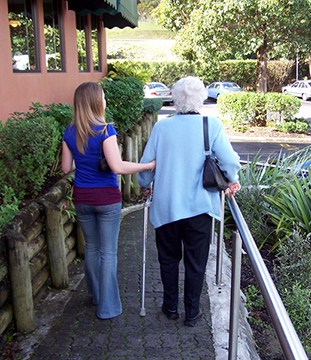The Benefits of Caregiving

Posted by Steve Jones
Tue, Nov 11, 2014
When we give cheerfully and accept gratefully, everyone is blessed.
~ Maya Angelou
If you want others to be happy, practice compassion. If you want to be happy, practice compassion.
~ Dalai Lama
Popular media and quite a bit of scientific research have tended to focus on the negative aspects of family caregiving. Most people believe that caregiving is stressful, expensive, time-consuming and hard on relationships. Yet there are many positive results from caregiving.
Giving back is based in our biology. The nurturing instincts that inspire us to care for our children make us want to care for others, too. A 5-year study published in the American Journal of Public Health found that giving to others reduces anxiety and much of the negative impact that stress has on your health.
- Caregiving increases positive emotions “ compassion, satisfaction and happiness. The act of giving releases the neurotransmitter dopamine from the pleasure center in the brain, creating what some have called a helpers high. You might not feel “high” but you do feel good about yourself and the world around you. Focusing on another rather than yourself takes you out of your negative thoughts.
- Caregiving improves quality of life for both the recipient and the caregiver, and makes you appreciate what you have. Whatever negatives exist in your life, they seem less negative in comparison to someone elses. You can also appreciate the strength your loved one has to get through their own struggles.
- Caregiving inspires self-confidence. When you take care of someone who cant care for themselves, you realize how much you can do. You learn new skills and might even have to test the limits of your capabilities. Caregiving can help you stay in better physical shape. Studies have shown that high-intensity caregivers – those who do a lot for their loved ones – perform better on tests that measure such things as grip strength, rising fom a chair and walking pace. Caregivers also score higher on tests that measure memory and other cognitive skills.
- Caregivers may actually live longer. A number of international studies have found that helping others increases your lifespan. Evidence points to a reduction in mortality of as much as 20% to 40%.
- Caregiving can strengthen family ties. You may learn things about your loved one you never knew. You are also demonstrating a model of caregiving that could become your legacy to your family.
In the midst of the day-to-day stresses of caring for someone, you may find yourself focusing on how difficult it is, feeling pulled in conflicting directions, worried about the future. While the benefits of caregiving are real, they may not show up automatically. As the Dalai Lama said above, by practicingcompassion, making a conscious effort to find the positive in caregiving, you might find yourself happier. Finding the good side of caregiving is not naivet or hiding your head in the sand. It is a smart way of coping with stress that will yield positive benefits.
More questions?
Want to speak to a care expert about how to ensure the safety of your loved one during these uncertain times?
Let's connect you with the closest available Qualicare expert in your city to answer your questions.
The Qualicare Difference
Comprehensive care planning led by experienced Care Experts
"Qualicare changed everything. Mom loves her new companion, meanwhile Jack and I have peace of mind and more time to focus on the kids. "
Janette Aldermaine


 Have Questions?
Have Questions?